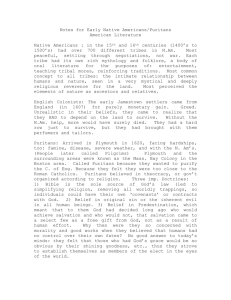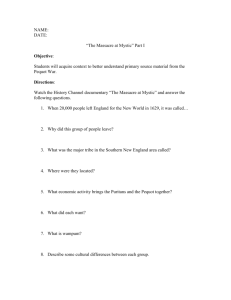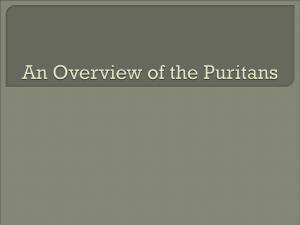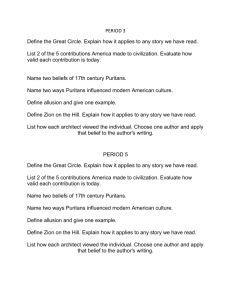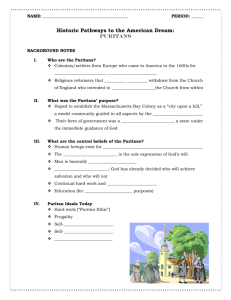Editorial: Learning from the Puritans
advertisement
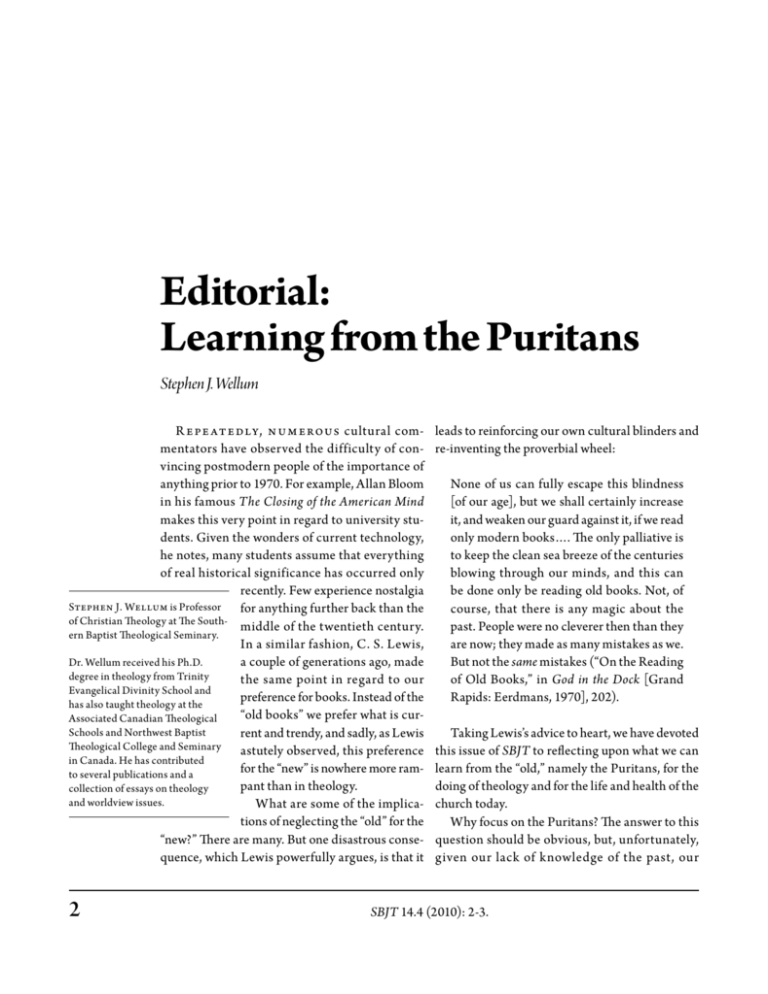
Editorial: Learning from the Puritans Stephen J. Wellum R e pe at e dly, n u m e rous cultural commentators have observed the difficulty of convincing postmodern people of the importance of anything prior to 1970. For example, Allan Bloom in his famous The Closing of the American Mind makes this very point in regard to university students. Given the wonders of current technology, he notes, many students assume that everything of real historical significance has occurred only recently. Few experience nostalgia Stephen J. Wellum is Professor for anything further back than the of Christian Theology at The Southmiddle of the twentieth century. ern Baptist Theological Seminary. In a similar fashion, C. S. Lewis, a couple of generations ago, made Dr. Wellum received his Ph.D. degree in theology from Trinity the same point in regard to our Evangelical Divinity School and preference for books. Instead of the has also taught ­t heology at the “old books” we prefer what is curAssociated Canadian Theological Schools and Northwest Baptist rent and trendy, and sadly, as Lewis Theological College and Seminary astutely observed, this preference in Canada. He has contributed for the “new” is nowhere more ramto several publications and a pant than in theology. collection of essays on theology and worldview issues. What are some of the implications of neglecting the “old” for the “new?” There are many. But one disastrous consequence, which Lewis powerfully argues, is that it 2 leads to reinforcing our own cultural blinders and re-inventing the proverbial wheel: None of us can fully escape this blindness [of our age], but we shall certainly increase it, and weaken our guard against it, if we read only modern books…. The only palliative is to keep the clean sea breeze of the centuries blowing through our minds, and this can be done only be reading old books. Not, of course, that there is any magic about the past. People were no cleverer then than they are now; they made as many mistakes as we. But not the same mistakes (“On the Reading of Old Books,” in God in the Dock [Grand Rapids: Eerdmans, 1970], 202). Taking Lewis’s advice to heart, we have devoted this issue of SBJT to reflecting upon what we can learn from the “old,” namely the Puritans, for the doing of theology and for the life and health of the church today. Why focus on the Puritans? The answer to this question should be obvious, but, unfortunately, given our lack of knowledge of the past, our SBJT 14.4 (2010): 2-3. familiarity with the Puritans is lacking. In fact, the name, “Puritan(s)” conjures up a variety of images for people. Probably the most predominant image today, as in the seventeenth century when the word was often used in a pejorative sense, is that of a fanatical, conceited religious person and social extremist. However, this image is nothing but a terrible distortion of the truth. Even though Puritans were not a monolithic group with the exact same theological convictions in every matter, those who were considered part of it represent some of the most devoted, conscientious, theologically driven, and Christ-centered individuals the church has known. In their writings and in their lives, the Puritans are fellow believers from a previous era with which the contemporary church needs to become familiar and which we neglect to our spiritual impoverishment. “Puritanism,” as a broad movement, is generally dated between the years 1550-1700 (though not limited to this period), primarily located in England and in New England (though its inf luence far surpassed these places). Puritanism was a movement that lived between a crucial transition era in Western church history—between the end of the medieval era and the impact of the Reformation and the important post-Reformation era and the rise of the modern world with all of its theological, social, and political challenges. Even though Puritanism was diverse, “Puritans” were united in emphasizing personal conversion, they rejoiced in God’s sovereign grace in election, and as a result, their hearts’ desire was to live their lives to God’s glory. Puritans also sought to establish a pure church modeled on the pattern of the NT and thus they emphasized a true spirituality grounded in Scripture, centered in Christ and all of his glorious cross work, and lived out by the power of the Holy Spirit. In addition, they sought to live out their Christian convictions in very practical terms—individually before God, in their families, in their work, and in the larger society. In fact, even though Puritans differed in their sociopolitical views, they were concerned to make their communities and thus the nation a model Christian society as they sought to bring all of their thought and lives captive to Christ and the gospel. Probably what the contemporary, evangelical church can learn most from the Puritans is how to live a whole life to God’s glory. Four examples will suffice. First, their writings on the Christian life—Christian spirituality, communion with God, meditating on Scripture with the goal of applying God’s Word to every area of our lives— are a needed antidote to our present spiritual poverty and superficiality. Second, their theological works which unpack and defend the great truths of the Christian faith—the doctrines of the Trinity, original sin, the person and work of Christ, the work of the Spirit, and so on—are must reading for today given our massive theological compromises in so many of these areas. Third, their love for the purity and holiness of the church, their gospel ministry, and their encouragement to Christian ministers to preach and teach the Scriptures in season and out, desperately need to be heard today, especially by those who sense God’s call on their lives to serve the church of the living God. Fourth, their example of how to contend for the truth and joyfully live their lives in light of eternity especially in the face of suffering and persecution is something the evangelical church has to learn. The Puritans experienced systematic persecution for their convictions; what we today think of as comforts were unknown to them; they had no modern medicines, social security, insurance; and they lived amidst high rates of child mortality, disease, discomfort, and pain. Yet, they lived lives of joy; they viewed themselves as pilgrims traveling to the Celestial City; and they knew how to live because they knew how to die in Christ. Even though this issue of SBJT can only begin to scratch the surface in regard to Puritanism, it is my prayer that it will challenge us to learn from them, not to idolize them nor even fail to critique them, but to learn with them how to stand for the truth and to live lives that wonderfully reflect the glory of God in the face of our Lord Jesus Christ. No greater tribute to them could be made than to follow their example in this regard. 3
